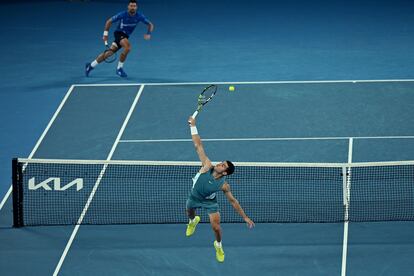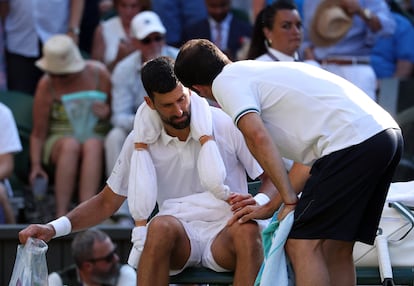Djokovic, against age and the elements: "It's not bad luck, my body beats me up; it is what it is."

Novak Djokovic is hurt. Very upset. And that's undoubtedly good news for him, since the opposite would be devastating and probably decisive for the most successful player in the history of men's tennis. His blood is still boiling. The storm raged over his team members: "Just watch and be quiet, watch and be quiet! Don't say a word, just watch!" And now he doesn't want to beat around the bush. Before the moderator finishes the formal introduction to the press conference, the Serb, beaten by Jannik Sinner in the semifinals and already eliminated from this Wimbledon, interrupts: "Shall we start with the questions?" "Let's get straight to it."
He's a wounded giant. It's not about losing, which is also a problem, but about perspective. Djokovic looks to the horizon and can't find a way out. Not this time. He, king of the Houdinis , the man who always found the key to the lock, is starting to see things as truly complicated. He's 38 years old and faces a challenge of colossal dimensions, perhaps insurmountable. Sinner (23) and Carlos Alcaraz (22) have already emerged and are competing like two sparks , but beyond that, the tennis player is processing and digesting as best he can an even greater handicap: age. His body. For some time now, he says, it hasn't functioned the same. It doesn't react the same way to effort or recovery, and it's becoming increasingly fragile no matter how much he devotes his full attention to it.
“The feeling wasn't pleasant,” he admits. “I don't want to go into details about my injury [which occurred during the quarterfinals against Flavio Cobolli, after a slip] and just complain. I want to congratulate Jannik on his great performance; he did very well,” he says, before being reminded of the unfortunate events of this season, in which an injury forced him to retire in the Australian Open semifinals and this latest setback—unspecified, but which forced him to suspend training the day before and clearly hampered his performance on court beforehand—has prevented him from fully facing the world number one. But that's precisely what's troubling him: game and physique go hand in hand. And perhaps there's no way out.

A legend opens up in the conference room. Nole, with an open heart. “I don't think it's bad luck,” he explains. “It's just age, the wear and tear on my body. No matter how much I take care of myself, reality hits me hard; not just now, but over the last year and a half. Like never before. I find it hard to accept because I believe that when I'm fresh, in shape, I can still play very well. I've proven it. But playing five sets is a struggle for me; the longer the tournament goes on, the worse I am. I reach the final rounds [semifinals in the three majors], but once there I have to play against Alcaraz or Sinner. And they're in shape. I feel like I go into these matches with a half-empty tank,” he admits.
Pioneer“And like this,” he continues, “it's not possible to win a match like this. It is what it is.” He denies, in any case, that this was his last match at La Catedral, where he has won seven titles, only one less than the Swiss Roger Federer. And he anticipates: “I want to come back one more time.” It will be his physique, however, that will dictate whether he will return or whether he must end a long career that, with the exception of 2018, when he had to undergo elbow surgery , has been free of complications because, in addition to having a privileged physique, Djokovic was a pioneer in terms of nutrition, strengthening, and prevention. Techniques that are now fully integrated into elite sport and which he incorporated more than a decade ago were once even the subject of ridicule.

His frame, however, continues to send him signals. He suffered a muscle strain in Australia, and last season, he tore his right meniscus in Paris . He still has tennis left, well above average, but the possibility of keeping up with the high pace imposed by Alcaraz and Sinner in the final stretch of tournaments seems increasingly remote. He limits his schedule to the essential events—ten events, with a record of 27 wins and nine losses—and maintains that he no longer has any greater motivation than the Grand Slams, despite having hinted at his desire to reach the Los Angeles Games (2028). But even so, it's not enough. It remains to be seen whether he will end up fully accepting this reality.
“It's difficult to say right now what the plan is for the coming months. I'll probably have to review everything and see with my team, with my family, how I want to proceed and where I want to reach my maximum. I don't know what I can do differently, to be honest, because I don't think anyone takes better care of themselves than I do . Unfortunately, I'm not rewarded for that now,” he laments. “I'm upset and disappointed, but not so much because of the defeat as because of the physical aspect. You're there, determined, you want to play; but then your body doesn't listen. That's it,” concludes the Belgrade native, who sees no greater incentive between now and the end of the year than the US Open, a venue that has recently resulted in disappointment for him. It's Nole against the elements.
AC | London
Despite the challenges, Djokovic's performance in 2025 guarantees his presence at the Turin Masters Cup. Specifically, the Serbian is third in the annual race. He has only celebrated one title, in Geneva, but the prize was by no means minor, as it was the 100th of a career that began at the elite level 20 years ago.
Admired and respected, he clashed with Sinner again, and Alcaraz emphasized the value of the Italian's victory. "Beating Novak is very difficult, and doing it in three sets is even more difficult. Jannik's performance was commendable because he didn't let up," said the Spaniard, who was beaten by the veteran in their last two meetings.
However, he will be the one to debate Sinner on Sunday (5:00 p.m., Movistar+). Favorite? “I'd say Carlos has a slight advantage because he won two titles here and because of his current confidence,” Djokovic clarifies, “but it's only slight because Jannik is also hitting the ball very well. I think it's going to be a very close match, like the one in Paris.”
Alcaraz and Sinner will close out the competition, after the Polish Iga Swiatek and the American Amanda Anisimova battle in the women's final this Saturday (5:00 p.m., Movistar+).
EL PAÍS



